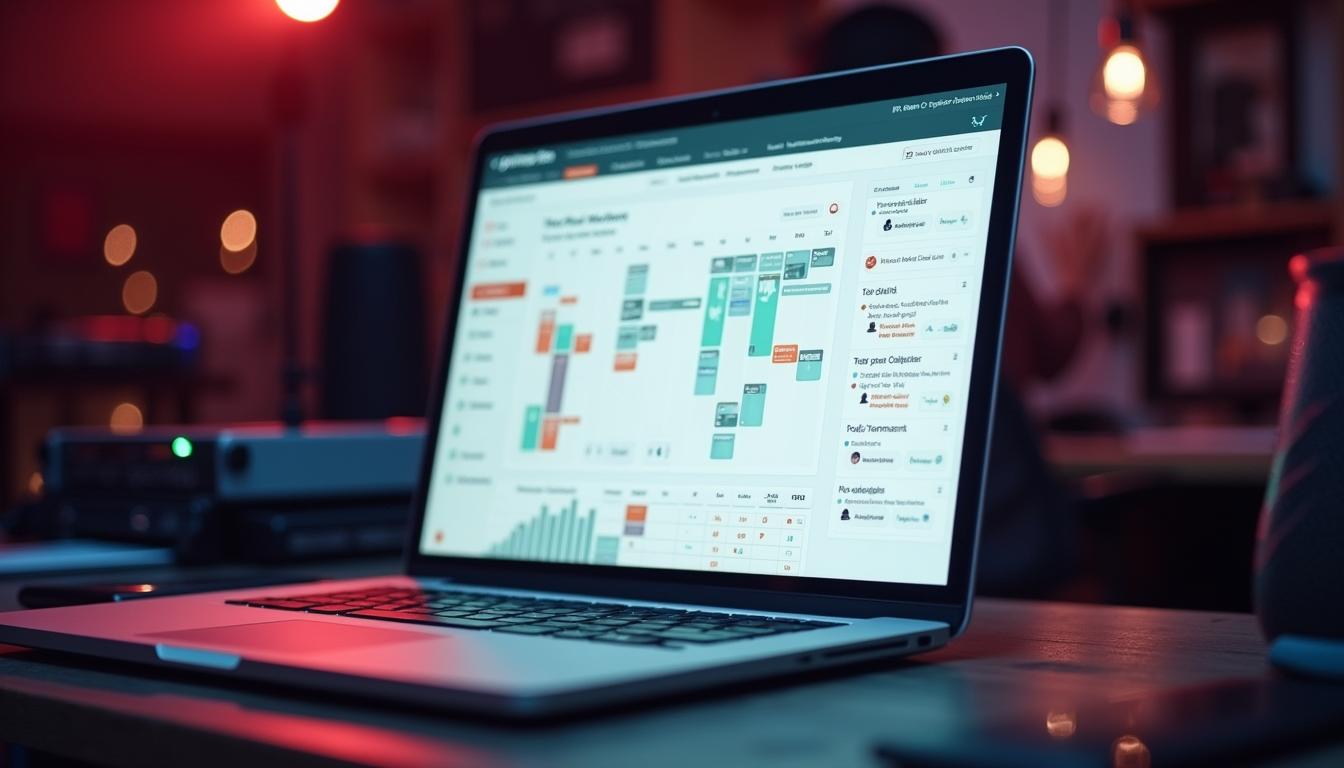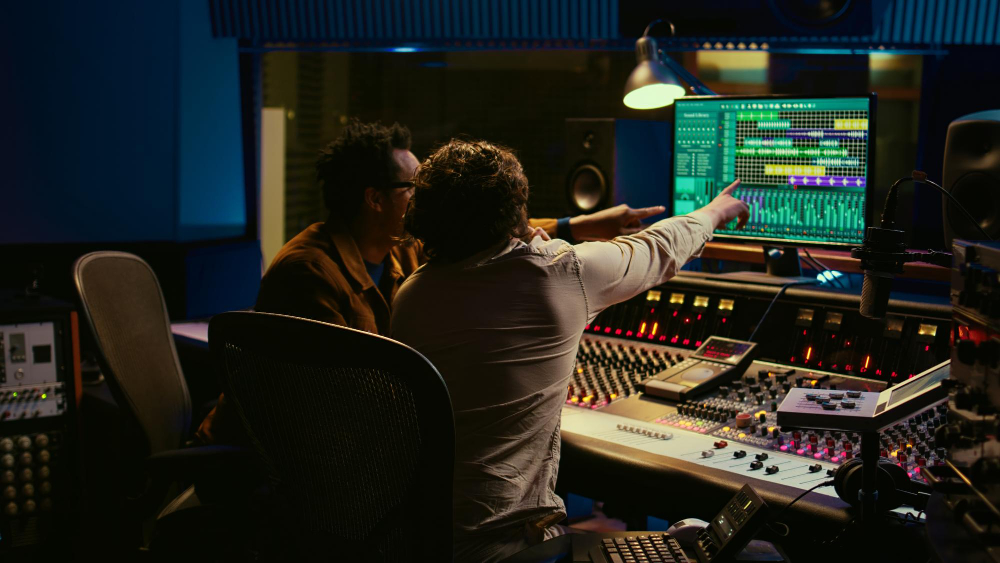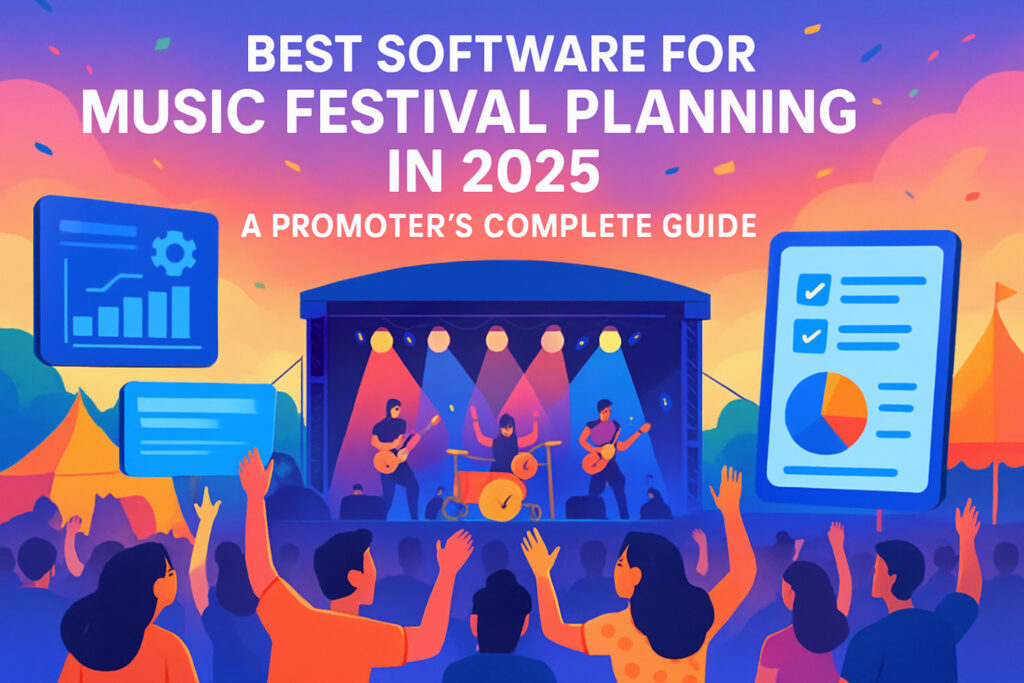
How to Simplify Talent Buying with Software
Managing a live music venue means juggling endless moving pieces—artist negotiations, contract approvals, financial settlements, and calendar coordination. If you’re still operating with spreadsheets and manual processes, you’re burning through hours that could be spent building relationships with agents and discovering new talent. The live music industry is experiencing unprecedented growth, with revenues reaching over 33 billion U.S. dollars in 2023, representing a 25% increase from the previous year. Yet many venue operators remain stuck in outdated workflows that limit their ability to capitalize on this boom.
Talent buying software has emerged as the game-changing solution that transforms chaotic booking processes into streamlined, efficient operations. Instead of drowning in email chains and lost contracts, today’s smartest venue managers are leveraging technology to automate repetitive tasks, improve communication, and make data-driven decisions that boost profitability.
The Pain Points That Plague Traditional Talent Buying
Communication Chaos and Lost Opportunities
Every venue manager knows the frustration of missing a crucial email buried in an overflowing inbox. Traditional talent buying relies heavily on email threads that quickly become unwieldy, phone calls that lack documentation, and text messages that disappear into the digital void. When critical information gets lost in this communication maze, opportunities slip through the cracks.

Agents represent multiple artists, and they move fast. If your response gets buried in their inbox or your hold request arrives too late because you were manually checking availability across three different calendars, that prime Saturday night slot goes to a competitor. The average venue employee spends between one and four hours every day on booking and ticketing alone, and much of that time is wasted on administrative tasks rather than relationship building.
Spreadsheet Struggles and Version Control Nightmares
Excel sheets and Google Docs might seem like trusty companions, but they become liability magnets in the fast-paced world of live music. Multiple team members editing different versions, outdated information being shared with agents, and financial calculations prone to human error create a perfect storm of operational inefficiency.
When your booking data lives across disconnected systems, getting a clear picture of your venue’s performance becomes nearly impossible. How do you quickly assess which months need more bookings? Which agents consistently deliver profitable shows? Which artists have the best track record at your venue? Without centralized data, these crucial business insights remain hidden.
Financial Tracking and Settlement Headaches
Settlement time shouldn’t feel like solving a complex math puzzle, yet venue managers regularly find themselves wrestling with scattered receipts, manual calculations, and payment tracking across multiple platforms. The traditional approach to financial management leaves room for costly errors and makes it difficult to understand the true profitability of each show.
When talent costs can account for approximately 75% to 85% of total ticket sales revenue, precision in financial tracking becomes critical for maintaining healthy margins. Manual processes increase the likelihood of miscalculations that can turn profitable shows into financial disappointments.
How Talent Buying Software Transforms Your Process
From Reactive to Proactive Management
The fundamental shift that talent buying software provides is moving venue operators from reactive firefighting to proactive management. Instead of scrambling to respond to opportunities as they arise, you gain the tools to strategically plan your calendar, identify gaps before they become problems, and maintain consistent communication with your network of agents and artists.
Modern software solutions provide real-time visibility into your entire booking pipeline. You can see at a glance which holds are expiring, which contracts need attention, and which shows require advance work. This bird’s-eye view enables strategic decision-making rather than constant crisis management.
Centralized Communication Hub
Talent buying software eliminates communication silos by creating a centralized hub where all booking-related conversations, documents, and decisions live. Every email exchange with an agent, contract revision, and internal note becomes part of an organized, searchable record. When team members need context about a particular show or artist relationship, the information is immediately accessible.
This centralization proves invaluable when staff transitions occur or when you need to reference past negotiations. The institutional knowledge that typically walks out the door with departing employees instead becomes part of your venue’s permanent database.
Automated Workflow Efficiency
The power of automation becomes apparent when you consider that workflow automation can save organizations up to 77% of their time. In talent buying, this translates to automated hold notifications, contract generation, payment reminders, and settlement calculations. Tasks that previously required manual intervention now happen seamlessly in the background.
Automation also reduces human error. When contract terms are automatically populated based on negotiated parameters, when payment schedules are generated according to your venue’s standard terms, and when settlement calculations happen automatically based on actual ticket sales, the margin for costly mistakes diminishes significantly.

Key Features That Simplify Talent Buying
1. Intelligent Calendar Management
Smart calendar systems go beyond basic date tracking. They provide conflict detection, radius clause monitoring, and capacity optimization suggestions. When an agent proposes a hold, the system immediately flags potential issues like overlapping events or competing shows in nearby venues. This intelligent calendar management prevents double bookings and helps maintain positive relationships with both artists and competing venues.
2. Automated Contract Generation and Management
Modern booking software enables rapid contract creation using templates that can be customized for different types of shows, artists, and deal structures. Electronic signature capabilities mean contracts can be executed in minutes rather than days, accelerating the entire booking process and reducing the risk of artists accepting competing offers while waiting for paperwork.
3. Real-Time Financial Tracking and Settlement
Comprehensive financial modules track every aspect of show economics, from initial artist guarantees and production costs to final ticket sales and merchandise splits. Real-time reporting provides instant visibility into projected and actual profitability, enabling data-driven decisions about everything from ticket pricing to marketing spend.
Settlement generation becomes automatic, with the software calculating payments based on actual sales figures, deducting agreed-upon expenses, and generating detailed reports for both venue management and artist representatives. This automation eliminates the time-consuming manual calculations that traditionally turn settlement week into a stressful scramble.
4. Integrated Communication Tools
Built-in messaging systems maintain complete communication histories while enabling quick exchanges with agents, artists, and internal team members. Instead of hunting through email threads, every conversation becomes part of the permanent record associated with specific shows or artists. Automated notifications ensure nothing falls through the cracks.
5. Advanced Reporting and Analytics
Data-driven venue management requires robust reporting capabilities. Talent buying software provides insights into booking patterns, financial performance by genre or time period, agent productivity, and artist draw patterns. These analytics enable strategic decision-making about everything from booking strategies to marketing investments.
6. Mobile Accessibility
The live music business doesn’t stop when you leave the office. Mobile-optimized platforms ensure you can respond to time-sensitive opportunities, approve contracts, and monitor show progress from anywhere. Whether you’re at another venue scouting talent or traveling to industry conferences, your entire operation remains accessible.

The Real ROI of Talent Buying Software
Quantifiable Time Savings
The efficiency gains from implementing talent buying software compound quickly. Consider that automation can boost productivity by 14.5% while reducing operational expenses. For venues handling hundreds of shows annually, these improvements translate to thousands of hours returned to productive activities.
Instead of spending time on repetitive administrative tasks, venue managers can focus on relationship building, strategic planning, and business development. The software handles the routine work while humans concentrate on activities that drive growth and profitability.
Improved Decision-Making Through Better Data
Access to comprehensive, real-time data transforms how venue operators make decisions. Instead of relying on gut feelings or incomplete information, managers can analyze trends, compare performance metrics, and identify opportunities for improvement. This data-driven approach leads to better booking decisions, more effective pricing strategies, and improved financial performance.
Enhanced Professional Reputation
Venues that operate efficiently and professionally stand out in an industry where chaos often reigns. When you respond quickly to opportunities, manage contracts seamlessly, and handle settlements accurately, agents notice. This enhanced reputation leads to better show opportunities, preferred status with top agents, and access to emerging talent before competitors.
Reduced Stress and Improved Work-Life Balance
The psychological benefits of organized systems shouldn’t be underestimated. When venue managers have confidence in their processes, when information is easily accessible, and when routine tasks happen automatically, stress levels decrease significantly. This improved work environment leads to better staff retention, more creative thinking, and sustainable business growth.
Choosing the Right Talent Buying Software
Industry-Specific vs. Generic Solutions
The music industry has unique requirements that generic event management software often fails to address. Look for solutions designed specifically for live music venues, with features like artist rider management, percentage-based payment calculations, and industry-standard contract templates. Generic software may seem cost-effective initially but often requires extensive customization to handle music industry workflows.
Integration Capabilities
Your talent buying software should integrate seamlessly with existing systems like ticketing platforms, accounting software, and marketing tools. This integration eliminates data silos and reduces the manual data entry that leads to errors and inefficiency. Strong integration capabilities ensure your software investment enhances rather than complicates your existing workflow.
Scalability and Flexibility
Choose software that can grow with your venue. Whether you’re managing one intimate club or multiple large-scale venues, the system should accommodate your current needs while providing room for expansion. Flexible pricing models and modular features allow you to invest in capabilities as you need them rather than paying for unused functionality.
Support and Training Resources
Implementation success depends heavily on vendor support quality. Look for providers that offer comprehensive training, responsive customer service, and regular software updates. The live music industry moves quickly, and your software provider should demonstrate a commitment to keeping pace with industry changes and user needs.
Implementation Best Practices
Start with Data Migration Strategy
Before diving into new software, develop a clear plan for migrating existing data. This includes historical booking information, contact databases, and financial records. Clean, accurate data forms the foundation for effective software utilization, so invest time in data preparation and validation.
Involve Your Entire Team
Software adoption succeeds when entire teams embrace the change. Include staff members from all relevant departments in the selection process, provide comprehensive training, and establish clear protocols for using the new system. Resistance to change can undermine even the best software implementation.
Define Success Metrics
Establish clear benchmarks for measuring implementation success. This might include time savings in booking processes, reduction in contract errors, improvement in settlement accuracy, or increased booking volume. Regular measurement against these metrics ensures you’re realizing the expected return on investment.
Plan for Gradual Rollout
Consider implementing software features gradually rather than attempting a complete system overhaul simultaneously. Start with core booking functions, then add financial modules, reporting capabilities, and advanced features as your team becomes comfortable with the platform. This phased approach reduces disruption and allows for course corrections during implementation.
Stop Struggling, Start Thriving
The live music industry’s rapid growth creates incredible opportunities for venue operators willing to embrace modern tools and processes. Talent buying software transforms chaotic, manual workflows into streamlined, efficient operations that free managers to focus on what truly matters: discovering great talent, building lasting relationships, and creating unforgettable experiences for audiences.
The choice isn’t whether to modernize your talent buying process—it’s whether to lead the transformation or struggle to keep pace with competitors who have already made the leap. In an industry where timing and efficiency can make the difference between landing a breakthrough artist and watching them sign with a competitor, the right software becomes a competitive advantage that pays dividends
Ready to transform your venue’s booking process and reclaim dozens of hours each week? Discover how Prism’s all-in-one live music management platform eliminates the chaos of traditional talent buying with intelligent automation, seamless communication tools, and powerful analytics designed specifically for live music professionals, for years to come.
FAQ Section
Q: How long does it typically take to see ROI from talent buying software?
A: Most venues see immediate time savings within the first month, with significant ROI typically realized within 3-6 months. The average organization saves over $46,000 annually through workflow automation, with live music venues often seeing even greater returns due to increased booking capacity and improved efficiency.
Q: Can talent buying software integrate with our existing ticketing platform?
A: Quality talent buying software should offer integration capabilities with major ticketing platforms. These integrations enable automatic sales data import, real-time revenue tracking, and seamless settlement calculations without manual data entry.
Q: What happens to our data if we need to switch software providers?
A: Reputable software providers offer data export capabilities and migration assistance. Before making a selection, confirm that your data can be exported in standard formats and that the provider offers transition support if needed.
Q: Is talent buying software suitable for smaller venues with limited tech budgets?
A: Modern talent buying software often offers tiered pricing models that make it accessible for venues of all sizes. The efficiency gains and error reduction typically justify the investment even for smaller operations, and cloud-based solutions eliminate the need for expensive hardware investments.
Q: How does talent buying software handle the unique requirements of different venue types?
A: Industry-specific software is designed to accommodate the varying needs of different venue types, from intimate clubs to large theaters. Customizable features, flexible contract templates, and scalable pricing models ensure the software adapts to your specific operational requirements rather than forcing you to change your proven processes.

Matt Ford is the founder and CEO of Prism.fm, an Austin-based software company revolutionizing live music event management. With a background in entrepreneurship and a degree from the University of Wisconsin-Madison School of Business, Ford combined his self-taught coding skills with firsthand experience as a concert promoter to address the inefficiencies he observed in the industry. In 2018, he launched Prism.fm, an all-in-one platform designed to streamline operations for venues, promoters, and agencies by replacing cumbersome spreadsheets with integrated tools for booking, financial tracking, and contract management. Under his leadership, Prism.fm has grown significantly, achieving $3 million in annual recurring revenue post-COVID and securing over $15 million in funding . Ford’s commitment to building user-centric solutions has positioned Prism.fm as a trusted partner for over 1,500 venues and promoters worldwide.


